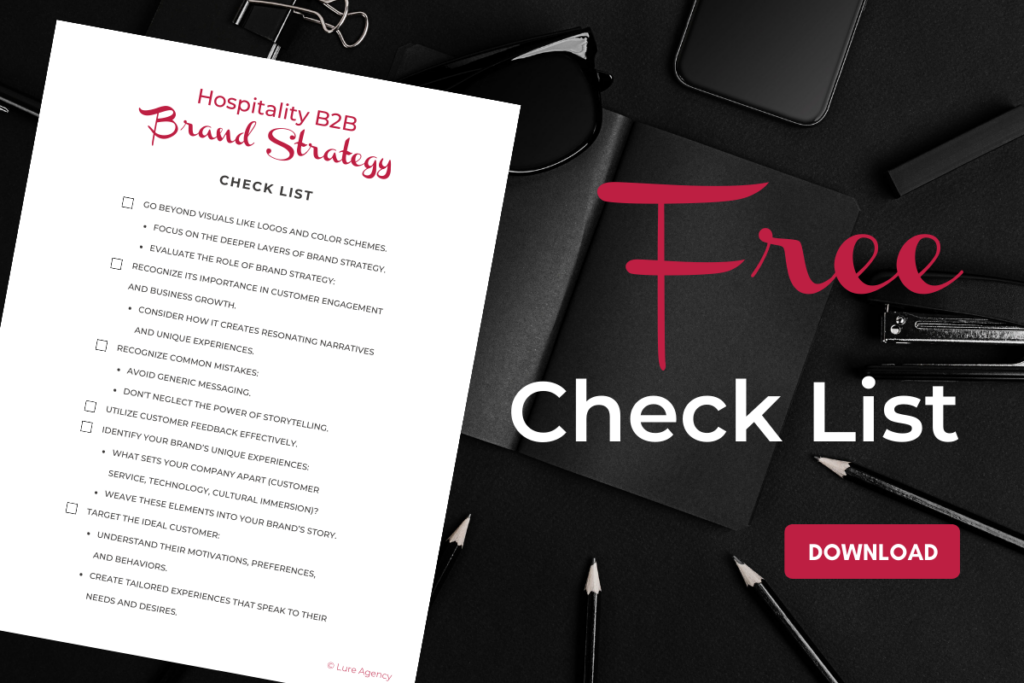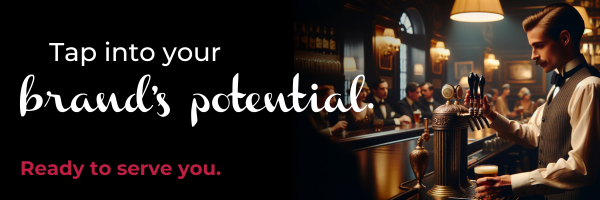
When you think of the term “branding,” what’s the first thing that comes to mind? Is it a logo? A color scheme? Maybe the aesthetics of a brand?
If you said yes, you're not exactly right ... and you’re not alone.
Unfortunately, there is a common misconception about what branding actually means. While the visuals are undoubtedly crucial branding elements, this surface-level understanding overlooks the deeper, more impactful layers of brand strategy, especially in a sector as dynamic and creative as hospitality.
Let’s dive into the importance of a brand strategy and explore whether it’s time to consider working with a hospitality branding agency.
In this post we'll cover:
- Secrets of Hospitality B2B Brand Strategy
- Understanding and Misconceptions
- Measuring ROI
- Avoiding Common Mistakes
- The Secret Sauce
- Target Audience Clarity
- Future of Hospitality Branding
- Choosing a Branding Agency
- Common Questions for a Branding Agency
Secrets of Hospitality B2B Brand Strategy
To help us explore the topic of hospitality B2B branding, Cory Falter of Lure and Mark Evans, a seasoned connoisseur of marketing and brand strategy, recently chatted to uncover some "secrets" to success.
With years of experience under his professional belt and a knack for cutting through the noise, Evans brings a unique perspective that challenges conventional thinking. His insights go into the core of what truly drives a successful brand in the hospitality industry - far beyond the mere visual elements.
What’s clear is the powerful role of brand strategy in the hospitality B2B sector cannot be overstated.
A solid brand strategy is the silent engine that propels brand identity, customer engagement, and, ultimately, business growth.
Understanding and implementing an effective brand strategy is paramount in an industry that thrives on customer experience and satisfaction. It’s about creating a narrative that resonates, experiences that linger, and a brand presence that stands out in a crowded marketplace.
As we journey through Cory and Mark's insights, we set the stage to unveil the secrets of brand strategy in hospitality B2B - going beyond the logo to discover what truly makes a brand tick in this ever-evolving industry.
The Misunderstood Nature of Brand Strategy
The hospitality industry changes at break-neck speed. As such, understanding brand strategy is a bit tricky. It's well-known but often not fully understood.
Think of it this way: most businesses in this industry want quick, obvious results.
Branding, though, isn't always about quick wins. It's both an art and a science, and it plays the long game in a world that usually wants fast victories.
Mark explains, “The tough part about brand strategy is that you can't immediately see its effects... Figuring out the long-term value of great messages or branding isn't straightforward."
This shows why brand strategy doesn't always get the attention it deserves. In the rush for quick success, a smart brand strategy's deeper, lasting impact is often missed.
However, the real strength of brand strategy shows up over time.
It's like planting seeds that grow into strong relationships with customers.
It's about building a brand story that connects, grows with time, and stands for amazing experiences.
Unlike quick advertising campaigns, the effects of brand strategy take time to show up. But when they do, they make a big difference.
A good brand strategy builds trust, earns loyalty, and turns customers into fans who will support your business better than advertising or any ad could.
In the hospitality industry, where experiences and personal connections are key, the long-term effects of a well-planned brand strategy can be what makes a business really succeed. It's about building a reputation known before you even arrive, telling a story that touches your customers, and making your unique mark in a competitive field.
Cory adds, "In-N-Out Burger in California is a great example where the allure goes beyond just marketing. It's about how well they treat their employees. This feel-good aspect, deeply woven into their team structure, mission and culture, resonates with people, making it a unique part of their operational strategy."
While it might be hard to see the immediate results of brand strategy, its long-term benefits are clear and powerful.
A strong brand strategy doesn't just boost a business; it secures its future and keeps it relevant as the hospitality industry keeps changing.
Measuring the ROI of Brand Strategy
One of the unique challenges is figuring out the payoff, or return on investment (ROI), of brand strategy.
Unlike conventional marketing metrics, such as sales conversions or web traffic, the impact of brand strategy often eludes direct measurement. This is because brand strategy works in complex and subtle ways, affecting how customers think and behave over time.
Mark Evans sheds some practical light on this. He suggests looking at brand strategy through the eyes of the people who know it best: customers, employees, and partners.
This method understands that a brand's real strength is seen in the life experiences and thoughts of those it serves and works with. By getting feedback from these groups, businesses can learn a lot about how their brand is seen, what values people connect with it, and how it plays into their decisions.
"I understand the need for quick results and wins, similar to an SEO strategy balancing paid and organic efforts." Cory says, "It's about using different levers simultaneously, driving both paid and organic outreach. In the end, if consumers are presented with multiple options, they tend to choose the one they recognize. Brand recognition, whether through familiarity or prior exposure, often determines the winner in the consumer's choice."
To navigate the challenges of measuring the ROI of brand strategy, businesses in all industries beyond the hospitality sector need to look beyond direct revenue impact. Metrics such as customer satisfaction scores, brand loyalty, and repeat business rates offer a more nuanced understanding of a brand's effectiveness. Additionally, employee engagement and retention rates can indicate a healthy internal brand perception, which invariably influences external customer experiences.
YOU MAY ALSO ENJOY: Dark Social Could be the Reason Why Hospitality B2B Sales Attribution is a Bust
Social media listening tools and sentiment analysis can also play a crucial role in understanding how a brand and positioning is discussed and perceived on various platforms. Monitoring brand mentions, customer reviews and overall engagement on social media provides real-time feedback that can be invaluable in measuring the impact of brand strategy initiatives.
Plus, the long-term growth and staying power of a business can be a big sign of a successful brand strategy. A brand that keeps pulling in new customers while keeping the old ones adapts well to market changes, and has a good reputation is probably seeing the benefits of a strong brand strategy.
The long-term growth and sustainability of a business are perhaps the most telling indicators of a successful brand strategy.
A leading restaurant brand that consistently attracts new customers while retaining existing ones, navigates market changes effectively, and maintains a positive reputation is likely reaping the benefits of a solid brand strategy.

Common Branding Mistakes and How to Avoid Them
If you’re not working with a seasoned hospitality B2B branding agency, it’s possible you could fall into some common pitfalls, leading to some less-than-optimal results.
Understanding these common mistakes is crucial for businesses looking to elevate their brand effectively.
Steering Clear of Generic Messages
A big mistake is using messages that are too general. Trying to appeal to everyone, some companies end up saying nothing special about their brand. Mark Evans points out the risk of this 'one-size-fits-all' approach. In a market full of competition, not standing out can make a brand practically invisible.
Remembering the Power of Storytelling
Another key thing businesses forget is the importance of storytelling. A brand’s story is more than just a tale; it's about the emotional and psychological bond with customers. When companies overlook this, they miss out on connecting deeply with their audience.

Valuing Customer Feedback
Often, businesses don’t use customer feedback to shape their brand strategy. This can cause a gap between what the brand says and what customers actually want or value.
To avoid these common mistakes, here are some tips:
Find What Makes Your Brand Special
Work on a unique value proposition that makes your brand stand out. This means really digging into what your brand is about and how it's different from others. Do market research, look at what competitors are doing, and find your special points.
YOU MAY ALSO ENJOY: Exploring the Power of Creativity in Digital Marketing
Create Stories That Click
Focus on stories that your target audience can relate to. These stories should be real, interesting, and match your brand values. They should explain not just what you offer, but why it’s important to your customers.
Listen to Your Customers
Keep in touch with your customers to understand what they think and feel about your brand. Use surveys, social media chats, and customer reviews to get their opinions. This info is gold for making your brand strategy better and more relevant.
Stay Consistent
Make sure your brand message is the same across all platforms. Being consistent helps build trust and makes your brand more recognizable.
By steering clear of these mistakes and following these strategies, businesses in hospitality can create a brand strategy that’s not only unique and engaging but also really hits the mark with what their customers want and need.
👇 DOWNLOAD OUR HOSPITALITY B2B BRAND STRATEGY CHECKLIST (no opt-in required)👇

The Secret Sauce of an Effective Brand Strategy
In the quest for a standout brand strategy in the hospitality industry, Mark emphasizes a crucial ingredient: focusing on what makes a company's experience uniquely special.
Focusing on your unique differentiators is the secret sauce that can set a brand apart in a crowded marketplace.
Here’s how:
Emphasize Unique Experiences
Evans advocates for a deep dive into what makes your company’s offering distinct. Is it the unparalleled customer service, the innovative use of technology in enhancing guest experiences, or perhaps the rich cultural immersion offered? Identifying and highlighting these unique aspects in your brand narrative is key.
It's about weaving the team' unique attributes and experiences into your brand's story, making it not just heard but felt by your audience.
Cater to the Ideal Customer
Understanding and focusing on the ideal customer is pivotal.
This means going beyond demographics to grasp the motivations, preferences, and behaviors of your target audience. It’s about creating tailored experiences that speak directly to the needs and desires of your clientele.
This targeted approach ensures that your brand strategy resonates more deeply and creates a stronger emotional connection with your customers.
Real-World Examples of Successful Brand Strategies
This luxury hotel chain is a prime example of a brand that has mastered the art of unique experiences.
Their exceptional customer service, epitomized by their motto “We are Ladies and Gentlemen serving Ladies and Gentlemen,” sets them apart in the luxury hospitality sector.
Airbnb’s brand strategy revolves around the concept of ‘belonging anywhere.’
This messaging taps into the desire for authentic, local experiences, differentiating Airbnb from traditional hotel stays and resonating deeply with modern travelers who seek more than just accommodation.
Virgin Hotels has redefined the hospitality experience with its innovative, customer-centric approach.
From streamlined, tech-savvy rooms to personalized comfort, their focus is on delivering an experience tailored to individual preferences, making each stay unique.
The secret sauce of effective brand strategy in the hospitality industry lies in identifying and amplifying what makes your brand’s experience special, understanding your ideal customer, and crafting your brand narrative around these elements.
By following Evans’ advice and learning from real-world examples, hospitality brands and resorts can create a strategy that not only stands out in crowded market, but also creates lasting connections with their customers.
Getting Clear on Your Target Audience
A pivotal element in crafting an effective brand strategy is the clarity of the target audience.
Knowing precisely who your business is for – and, just as importantly, who it is NOT for – is crucial for delivering experiences that resonate and build loyalty.
Both Cory and Mark emphasizes this point, noting that a clear understanding of the target audience helps avoid disappointing experiences.
Mark states, "It’s almost better to say, 'Hey, if you're a couple looking for a romantic date and we're Chuck E. Cheese, you should not come to us. You will not have a good experience.'"
This candid acknowledgment of a business’s ideal and non-ideal customers and potential guests can prevent mismatched expectations and ensure more satisfying experiences for those clients who actually do align with the brand.
Case Studies of Successful Audience Identification
A leading player in hotel commerce, Siteminder has expertly identified its target audience: hotels seeking to maximize their online presence and booking potential. Understanding the needs of these hotels,
Siteminder tailors its platform to streamline online distribution, making it easy for hotels to manage bookings across various channels. This focus on providing user-friendly, efficient online distribution solutions has made Siteminder a favorite among hotels looking to expand their reach in the digital space.
Revinate, specializing in guest data management and marketing automation, targets hospitality businesses looking to personalize their customer interactions and increase direct bookings. By focusing on the needs of hospitality providers who want to leverage customer data for targeted marketing,
Revinate has carved out a niche for itself. Their platform's ability to integrate guest data and provide actionable insights allows hotels to craft personalized marketing strategies, enhancing guest engagement and loyalty.

Serving the food and beverage sector within the hospitality industry, Lightspeed POS offers a tailored point-of-sale and restaurant management system. Their target audience is clear: restaurants and cafes seeking efficient, technology-driven solutions for managing operations. By focusing on the unique needs of this sector, such as table management, menu customization, and sales analytics, Lightspeed POS has positioned itself as a go-to provider for restaurants looking to streamline operations and enhance the dining experience.
By focusing on the specific needs and preferences of their target audiences, these B2B companies have successfully developed brand strategies that resonate deeply within the hospitality sector. Their ability to understand and cater to the unique challenges and opportunities in this industry has not only ensured customer satisfaction but also fostered strong brand loyalty and recognition.
The clarity of the target audience is non-negotiable in an effective brand strategy. By identifying and understanding the unique needs and preferences of their ideal customers, hospitality and tourism businesses can create more meaningful and memorable brand experiences.
What the Future of Hospitality B2B Branding Looks Like
As we look into the future of hospitality B2B marketing, Mark offers insightful predictions and a sense of optimism despite the challenges encountered in previous years. He foresees a future rebound for hotels, with opportunities arising from this industry's previous challenges.
Evans suggests that the key to success in this evolving landscape lies in agility and the ability to adapt to changing customer needs. He emphasizes the importance of personalized and customer-centric marketing strategies, predicting that companies that can effectively leverage data to tailor their offerings and communications will be at the forefront.
There is a growing significance in the creative strategy to building strong brand communities and fostering genuine customer engagement. This approach, Mark believes, will help businesses navigate the complexities of the market and establish lasting relationships with their customers, setting the stage for sustainable growth.

Is it time to work with a hospitality branding agency?
When you're on the hunt for a hospitality branding agency, it's about finding the right partner.
You want to make sure they really get hospitality and have a track record of creative, successful campaigns.
Look for an agency that's not just about flashy designs, but one that digs deep into what makes your brand tick and how it connects with your customers. They should be experts in weaving stories that resonate with your target audience, using both the latest tech and timeless marketing techniques.
It's also crucial they have a thorough understanding of the latest trends and can adapt quickly to changes in the industry.
Don't forget to check out their hospitality case studies for past projects, especially those similar to your brand.
And lastly, great communication is key – you want an agency that listens to your ideas, gives clear feedback, and keeps you in the loop every step of the way.
Finding an agency that ticks all these boxes can make all the difference in elevating your brand in the dynamic world of hospitality.
Common Questions When Choosing a Hospitality Branding Agency
When diving into the search for a branding agency that’s a perfect fit for your hospitality business, several key questions should come to mind. These questions can guide you in making an informed and strategic choice:
What is their experience in the hospitality industry?
It's crucial to know if the agency has specific experience in hospitality. Ask about their previous projects in the industry and how they've tackled challenges similar to yours.
How do they approach brand storytelling for hospitality clients?
Every great brand has a story. Find out how the agency plans to uncover and tell yours. Are their methods innovative and do they resonate with your brand vision?
What’s their track record for success?
Look into the agency’s past successes. What kind of results have they achieved for other clients, especially in the hospitality sector? Do they have a proven track record? Success stories and case studies can be very telling.
How do they integrate customer feedback into their strategies?
Understanding how the agency uses customer insights to shape branding strategies is vital. Their approach to incorporating customer feedback can greatly influence the effectiveness of your brand messaging.
What are their strategies for brand differentiation?
In a competitive industry like hospitality, standing out is key. Ask how the agency plans to differentiate your brand from competitors in a meaningful and impactful way. Can they effectively create a visual identity from your story?
How adaptable are they to changes in the market and industry trends?
The hospitality industry is constantly evolving. It’s important to know how the agency stays updated with trends and how flexible they are in adapting strategies to meet changing market demands.
What kind of communication and collaboration can you expect?
Effective communication is the foundation of any successful partnership. Understand their communication style, frequency, and how they collaborate with clients to ensure your vision is accurately brought to life.
What is the expected ROI, and how do they measure success?
Discuss their expected outcomes and how they measure the success of their branding strategies.
Understanding their metrics for ROI can help align your goals and expectations.
By asking these questions, you’ll get a clearer picture of each agency’s strengths and how well they align with your hospitality brand’s needs. This process will enable you to choose an agency that understands the unique challenges of the hospitality industry and is well-equipped to elevate your brand to new heights.


